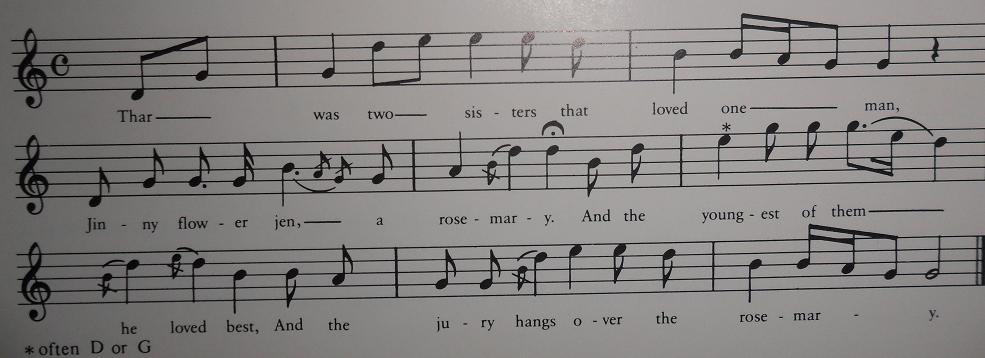The Two Sisters That Loved One Man- Presnell NC 1951
[Presnell, from Beech Mountain NC, was Buna Hick's uncle, hence the nickname Uncle Monroe. Frank Proffitt (source of Tom Dooley) married into the Hicks family. My grandfather, Maurice Matteson, collected ballads on Beech Mountain in 1933. Presnell's version was collected by Frank Warner in 1951. [Listen: Lee Monroe Presnell]
Hattie Presnell, Uncle Monroe's daughter-in-law, sang the Uncle Monroe's version with an additional stanza. She also sang the first refrain,
'Jinny flower, gentle rosemary."
11. Because he could not have the youngest for his wife,
Sweet William took his own life.
This refrain is also found in Nora Hicks version form the same region-- I consider it to be an ancient refrain.
R. Matteson 2011, 2014]
[A detailed explaination of Presnell's refrain is supplied by A. G. Gilchrist in her 1930 article, A Note on the "Herb" and Other Refrains of Certain British Ballads. The applicable part appears thus:
In the second form of refrain (b)
Jennifer gentle and rosemary
As the dew flies over the mulberry tree
Miss Broadwood explains gentle as hawthorn, but though the hawthorn is known by this name in Ireland, I do not think this is the meaning here. The curious
Jury flower gent the rose berry
of one of Mr. Sharp's Appalachian songs, though at first sight a much decayed form, probably comes quite near the original in sound if not sense, for "gelofir gent" is a description, c. 1500, of the gilliflower. The line runs, in more intelligible versions, Gilliflower gentle and rosemary. The line "Gilliflower gentle or rosemary" occurs in a lyric by Sir Thomas Philipps (temp. Henry VIII) in company with " Marjoram gentle or lavender " and "Camomile, borage, or savory." At that period and later herbs were classed as quick or gentle according to their degree of pungency of taste or smell. One of the cries of London was " Rosemary and bays, quick and gentle! " and Turner, in his Names of Herbes, 1548, includes "Baum [balm] gentle." So that "gentle" as it occurs in the refrain seems to be merely a descriptive adjective, and not the name of a plant. Prof. Child's guess that "gentle" should be "gentian" goes further astray, for gentian, though a common simple in America, is an unlikely plant to figure in allusions to old English herbs, and as far as I am aware has no magical uses.
The gilliflower ("July-flower" is a false etymology) is of course the clove carnation, though the name was later loosely given to wallflowers and stocks, the word being ultimately traceable, through French girofle and Latin Caryophyllum, to an Arabic word meaning clove. It seems to have been believed that any plant or flower with an aromatic or pungent scent would frighten evil spirits away. And gilliflowers in balladry are flowers of heaven.
From these considerations, I suspect that all the forms of this herb burden beginning with "Jennifer gentle," and all the "Gentle Jennies " which or who follow her, derive from the gilliflower refrain. But another development is seen when the herb-names are transformed in to the Christian names of three sisters. When the refrain has (apparently) been borrowed, with the tune to which it belongs, for another ballad of three sisters (also in mortal danger), such as "The Banks of Fordie " (Babylon), we not only find it unaltered as thus-
There were three sisters on a road,
Gilly flower gentle rosemary,
And there they met a banished lord,
And the dew it kings over the mulberry tree-
(Motherwell's MS.)
R. Matteson 2011]
THE TWO SISTERS THAT LOVED ONE MAN- sung by Lee Monroe Presnell, 1951 Beech Mountain, North Carolina
[Listen: Lee Monroe Presnell]

That was two sisters that loved one man,
Jinny flower jen, a rosemary.
And the youngest of them he loved best,
And the jury hangs over the rosemary.
O Sister, Sister, walk with me,
Walk with me to the miller's pond.
Oh, the oldest pushed the youngest in,
And they all perceived that the water was clear,
O Sister, Sister, reach me your hand,
You may have half of all the land,
O Sister, Sister, I won't reach my hand,
I will have all of the lands,
O Sister, Sister, reach me your glove,
You may have sweet William for your own true love,
O Sister, Sister, I won't reach my glove,
I will have sweet William for my own true love,
Oh, she floated around and she floated down,
She floated down to the miller's pond,
O miller, miller, come and see,
There is something here a-floating by me,
Oh, it isn't a fish or it isn't a swan,
It is sweet William's own true love,